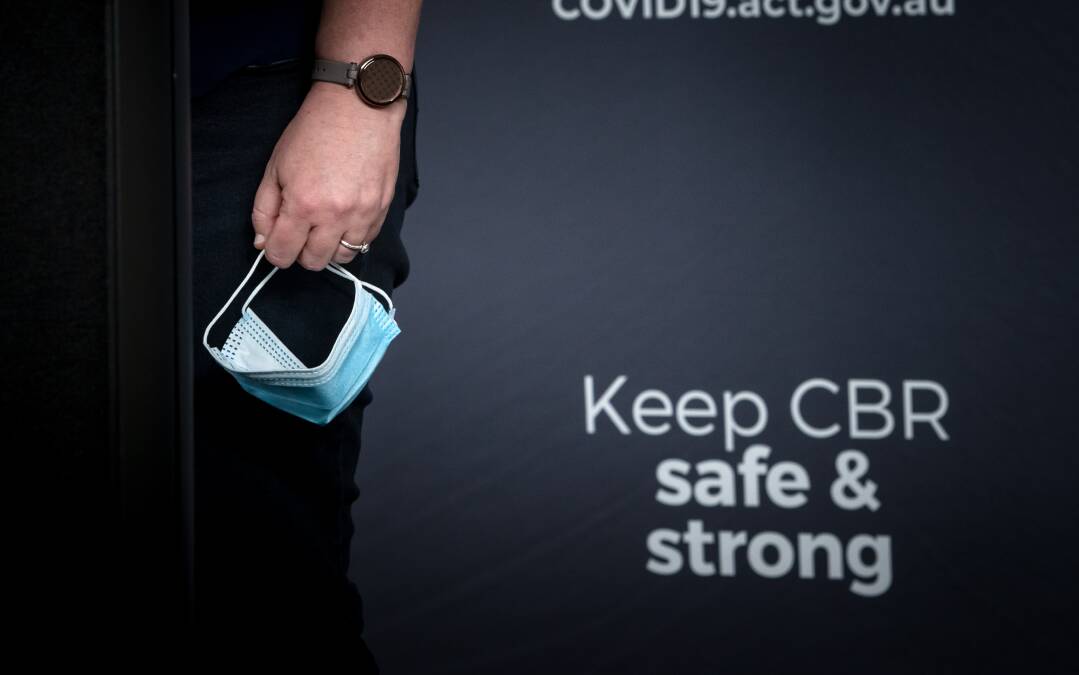
Dropping the week-long household contact isolation rule may not significantly drive up COVID-19 infections in the community, even though more people would be out and about while infectious, experts have said.
But one epidemiologist warned widespread COVID transmission would have an ongoing burden on the health system unless more was done to curb the virus' spread and prevent more long COVID cases.
The ACT government expects it will announce changes to household isolation rules later this week, as conversations continue between states on the eastern seaboard on how the rules will be eased.
Health Minister Rachel Stephen-Smith said she expected to speak with health ministers in NSW and Victoria over the coming days to clarify plans for the states, stressing that consistency around the rules was crucial.
Ms Stephen-Smith said there would likely still be some restrictions for household contacts, including requiring them to wear face masks in public and a ban on attending high-risk settings such as aged-care facilities and hospitals.
"[We might] require them to take a rapid antigen test if they're going into particular indoor settings [or] they're not able to visit high-risk settings," Ms Stephen-Smith said.
The ACT reported 816 new COVID-19 infections in the 24 hours to 8pm on Monday; there were 734 cases reported in the previous 24-hour period.
Professor Adrian Esterman, who holds the chair in biostatistics and epidemiology at the University of South Australia, said a decline in case numbers over the Easter long weekend was almost certainly caused by people not coming forward for testing while governments wound back their public health messaging.
"People are listening to that and thinking, 'Well, bugger it, I might have some symptoms but I'm not going to ruin my Easter'," Professor Esterman said.
Professor Esterman said the ACT's outbreak was in an unusual pattern, different to the other Australian states and territories.
He said other states and territories reached a second Omicron wave peak quickly and was now coming down the other side, but in the ACT that peak arrived slowly and case numbers were falling slowly, almost at a plateau.
Professor Esterman said it was "pot luck" that a new and more virulent variant had not entered Australia, and authorities needed to be ready to respond with appropriate restrictions.
"I'm not asking for bringing back lockdowns ... I'm asking for simple measures like encouraging people to wear face masks," he said of the current Australian pandemic conditions.
The ACT reached a 10-week high in hospital patients with COVID-19 on Tuesday, with 64 people who had tested positive for the virus receiving care. There were two people in intensive care and one person receiving ventilation.
Professor Catherine Bennett, who holds the chair in epidemiology at Deakin University, said the high prevalence of COVID-19 in the community meant there would be more people with the virus in hospital, even if they were receiving treatment for other issues.
"Hospital numbers themselves don't actually tell you how many people are seriously ill with it," Professor Bennett said.
Professor Bennett said it was likely a move to ease household quarantine requirements would have little effect on the rate of community transmission.
She said a blanket isolation rule was not giving the community good protection against the coronavirus, because many people isolated as household contacts would have already spent their infectious period mixing with other people.
"One of the things that might be inhibiting people getting tested is the possibility it comes back positive and it impacts their household contacts," Professor Bennett said.
"I think [a changed rule would put] the focus on people who actually have infections rather than managing that risk when that risk is unknown at the moment."
Professor Bennett said it was hard to say whether the Easter long weekend had much of an effect on COVID-19 transmission.
"The numbers are less predictable because we're only sampling cases now with our testing," she said.
"It's harder to read those day-to-day numbers with any certainty."
Ms Stephen-Smith said modelling for ACT Health showed a slow reduction in COVID-19 cases in the territory over the last few weeks, which had been the general trend although daily figures had jumped around.
"The numbers we've seen over the last few days - so anything between 600 and almost up to 1000, that's quite a reasonable range of numbers and we would expect our numbers to remain in that range ... and then potentially increasing again as we go into winter," she said.
The Australian Health Protection Principal Committee has been meeting to develop a plan for the easing of the household contact rules, after national cabinet agreed to work on a plan last month.
Ms Stephen-Smith said she recognised people had been frustrated about the household contact rules but there needed to be a balance. She said she expected there would be something to say later in the week.
"As we have moved more and more towards living with COVID-19, the disease is out in our community we're also seeing the impact on workforce that is having and so we do need to balance those risks," Ms Stephen-Smith said.
"But that has to be part of the conversation. What are the appropriate precautions? If we're not going to ask people to quarantine, what do we ask them to do while they're out and about in the community."
with Hannah Neale

.png?w=600)





